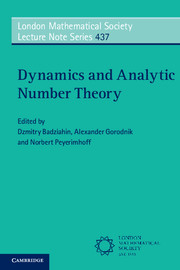Book contents
- Frontmatter
- Contents
- List of contributors
- Preface
- 1 Metric Diophantine Approximation: Aspects of Recent Work
- 2 Exponents of Diophantine Approximation
- 3 Effective Equidistribution of Nilflows and Bounds onWeyl Sums
- 4 Multiple Recurrence and Finding Patterns in Dense Sets
- 5 Diophantine Problems and Homogeneous Dynamics
- 6 Applications of Thin Orbits
- Index
Preface
Published online by Cambridge University Press: 03 November 2016
- Frontmatter
- Contents
- List of contributors
- Preface
- 1 Metric Diophantine Approximation: Aspects of Recent Work
- 2 Exponents of Diophantine Approximation
- 3 Effective Equidistribution of Nilflows and Bounds onWeyl Sums
- 4 Multiple Recurrence and Finding Patterns in Dense Sets
- 5 Diophantine Problems and Homogeneous Dynamics
- 6 Applications of Thin Orbits
- Index
Summary
This book is devoted to some of the interesting recently discovered interactions between Analytic Number Theory and the Theory of Dynamical Systems. Analytical Number Theory has a very long history. Many people associate its starting point with the work of Dirichet on L-functions in 1837, where he proved his famous result about infinitely many primes in arithmetic progressions. Since then, analytical methods have played a crucial role in proving many important results in Number Theory. For example, the study of the Riemann zeta function allowed to uncover deep information about the distribution of prime numbers. Hardy and Littlewood developed their circle method to establish first explicit general estimates for the Waring problem. Later, Vinogradov used the idea of the circle method to create his own method of exponential sums which allowed him to solve, unconditionally of the Riemann hypothesis, the ternary Goldbach conjecture for all but finitely many natural numbers. Roth also used exponential sums to prove the existence of three-term arithmetic progressions in subsets of positive density. One of the fundamental questions which arise in the investigation of exponential sums, as well as many other problems in Number Theory, is how rational numbers/vectors are distributed and how well real numbers/vectors can be approximated by rationals. Understanding various properties of sets of numbers/vectors that have prescribed approximational properties, such as their size, is the subject of the metric theory of Diophantine approximation, which involves an interesting interplay between Arithmetic and Measure Theory. While these topics are now considered as classical, the behaviour of exponential sums is still not well understood today, and there are still many challenging open problems in Diophantine approximation. On the other hand, in the last decades there have been several important breakthroughs in these areas of Number Theory where progress on long-standing open problems has been achieved by utilising techniques which originated from the Theory of Dynamical Systems. These developments have uncovered many profound and very promising connections between number-theoretic and dynamical objects that are at the forefront of current research.
Information
- Type
- Chapter
- Information
- Dynamics and Analytic Number Theory , pp. ix - xviiiPublisher: Cambridge University PressPrint publication year: 2016
